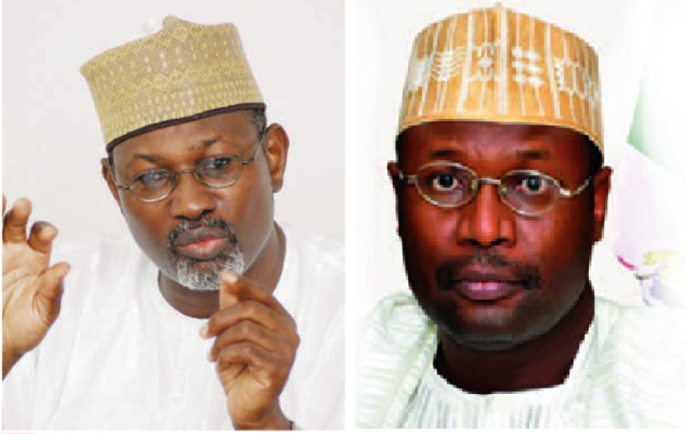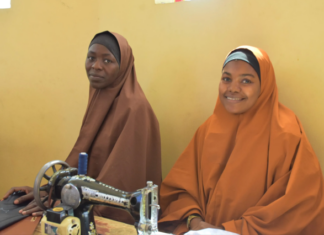•Jega keeps mum as Nwuche, others demand sack of INEC staff
Independent National Electoral Commission (INEC) staff deployed in Rivers State for the governorship and legislative elections on April 11 may face sanction.
There has been public outcry against retention of such staff since the Election Petitions Tribunal sitting in Abuja annulled in some councils the election of Governor Nyesom Wike and those of 20 legislators, including the speaker.
Nwuche’s agitation
One of those demanding the sack or redeployment of INEC staff in the state is former House of Representatives Deputy Speaker, Chibudom Nwuche.
Nwuche urged the new INEC Chairman, Mahmod Yakub, to get rid of those involved in electoral malpractices.
“The people who are in Port Harcourt should be deployed or sacked from the INEC because they were crooked. They put us in this mess in Rivers State. And for them to still remain there is unfair,” he said.
Nwuche, who defected from the Peoples Democratic Party (PDP) to the All Progressives Congress (APC) after the general elections, spoke on a Radio Nigeria Network News programme monitored in Abuja in which he sought free and fair elections to help democracy to grow.
His words: “It is always useful to allow free and fair elections. If for instance there is consensus in the state, the people can easily get involved in rigging, the idea being that there is consensus.
“But where there is no consensus, people should be allowed to vote freely and fairly, especially where violence is deployed as a means of achieving electoral result . It is not right for the polity, it is not good for our democracy.”
Nwuche expressed satisfaction with the nullification of elections in Rivers and Akwa Ibom States and asked Abuja to ensure hitch free reruns.
Jega cites subjudice
But the former INEC Chairman, Attahiru Jega, under whose watch the fraudulent polls in both Akwa Ibom and Rivers States were conducted, declined comment on what should be the fate of the staff involved.
Jega delivered the inaugural Annual Public Lecture of the University of Abuja on Thursday, October 29 where he was asked why the INEC accepted those results from the Rivers State and what would happen to the staff so involved.
He replied: “Your question on Rivers State is a bit difficult to answer because it is, as the lawyers say, subjudice. But you see, the electoral laws anticipate that these things will happen.
“As an electoral commission, you have to make a judgment one way or another, within a very short period of time and the judgment you make is conditional on the evidence available to you.
“The law says once a returning officer has made a return, only an election tribunal can reverse it.
“And we would have had cases even in the 2015 elections when a return would have been made and we knew it was wrong but I could not reverse it, nobody can reverse it.
“The only thing that can happen is that the contestant now has to go to the tribunal and give evidence.
“But what we were able to do within the five years we were there was that whenever we knew that an advertent mistake was made we provided evidence and told our lawyers to support the right thing.
“But the case of Rivers State is very complicated. The case is in court, so I don’t want to make comments on it.”
Reflects on previous elections
Jega also reflected on elections conducted since 1999.
“Given the fact that elections are the major pillar of leadership selection and governance legitimation in liberal democracies, a constant and unseizing effort for the reformation of the electoral process is an imperative in all countries that are democratising.
“It is especially necessary in countries in transition to democracy, such as Nigeria, where there is a long history of badly conducted elections; where elections have been bastardised, and where many voters have become despondent and have virtually given up hope of their votes counting in choosing their elected executives or representatives in legislatures.”
Jega reiterated that a series of badly conducted elections could create perpetual political instability and easily reverse the gains of democratisation.
“If adequate care is not taken, badly conducted elections can totally undermine democratisation and replace it with authoritarian rule, of the civilian or military varieties.
“At best, they can install inept and corrupt leadership that can herald, if not institutionalise bad governance.
“There are many illustrations or manifestations of this throughout Africa. But nowhere is this as amply illustrated as in the Nigerian case, especially between 1999 and 2007.”
He said it can be argued that the consequences of badly conducted elections and poorly managed electoral processes are major contributing factors to military interregnum in Nigeria’s political history.
“At inception of the Fourth Republic, the 1999 elections were conducted under military rule. There were fundamental flaws in the elections, but Nigerians wanted to get rid of military rule and have power transferred to civilians.
“They tolerated and accommodated the outcome, and hoped for future improvements.
“The 2003 elections, unfortunately, did not represent a substantive improvement over the 1999 elections, in terms of transparency and credibility.
“Rather, the elections at best represented ‘business as usual’, in terms of inflation of votes, fraudulent declaration of results, use of armed thugs to scare away or assault voters and cart away election materials and many other irregularities and illegalities, which were committed with impunity.
“The 2007 elections were manifestly the worst in Nigeria’s history, as declared by both domestic and international observers.
“The EU observer mission, for example, noted that the elections fell ‘short of basic international standards’, and were characterised by violence and crude use of money to buy votes.
“There was reckless mobilisation of ethno-religious cleavages and heightened use of money and thugs to influence results.
“The pre-electoral processes, such as party primaries were conducted in grossly undemocratic fashion. In many cases, the results were said to have gone to the highest bidder.
“The winner of the presidential election, the late Umaru Yar’adua, himself admitted on the day of his inauguration that there were serious flaws in the election that brought him to power.
“Arguably, in order to preempt a major crisis of legitimacy, he pledged to embark upon electoral reforms and subsequently inaugurated the Electoral Reform Committee, with the mandate to make wide ranging recommendations for electoral reform in Nigeria.”
A source in the INEC in Abuja told TheNiche that those involved in the electoral malpractices may be sanctioned after receipt of the certified true copy (CTC) of the tribunal rulings.
“The commission has to receive the CTC copy of the judgment and study it before it can take a decision.
“In the recent past, the commission adopted a zero tolerance to malpractice and we expect the new commission to continue with the same disposition,” he said.
It was learnt that Yakub is under intense pressure to sack the staff involved in electoral fraud in the last general election so as to serve as a deterrent to others.













